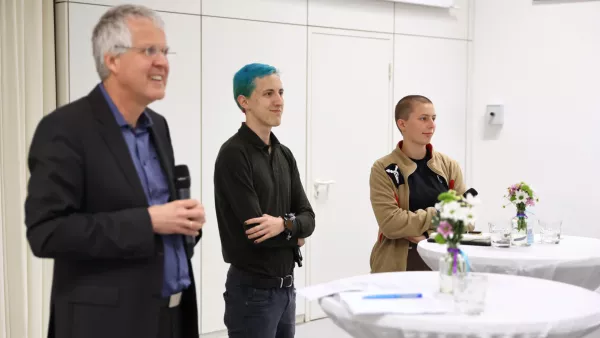
Weingarten - Generation X vs. Generation Z: career and status symbols vs. working less, living more, environmental awareness - all just prejudices? This question is discussed by representatives of the respective generations at the Early Night Social Talk "Shaping the Future Together" on May 16 at Ravensburg-Weingarten University of Applied Sciences (RWU). Professor Dr. Jan-Marc Hodek leads the evening as moderator. "The aim of the series of events is not just to talk about each other, but to talk to each other," explains the Vice Dean of the Faculty of Social Work, Health and Care, which is organizing the series of events.
On this evening, it's a conversation between generations: X (born between 1965 and 1979) and Z (born between 1995 and 2010). The older generation is represented by Professor Dr. Jörg Wendorff, Professor of Vocational Education and Educational Science and Dean of Faculty S at RWU. Opposite him are two 21-year-olds representing Generation Z: Charlie Kiehne, an environmental activist who currently lives in the Altdorf Forest, and Kenny Nißel who is studying social work at RWU and is involved in the student council.
Scientific facts vs. real life realities
After Jörg Wendorff first looks at the different generations from a scientific perspective with figures, data and facts, the three outline their life worlds: The young man with the blue-green hair who was born in Bautzen and grew up in a patchwork family; who describes himself as a digital native; for whom the world of the Internet and social media is a place of escape; who is studying social work to make the world a little better; and who is committed to individuality and diversity.
Next to her is the young woman with the short-shaven hair who grew up sheltered but quickly learned how to function in this society; who also learned early on to question norms and views; who has a high school diploma but consciously decided against training or studying; who wants to change this world and is committed to climate justice.
The third in the group is the professor with great professional commitment: first civilian service, then training and studies - true to the motto: "Live to work." Who stands for career orientation; for whom consistency and security are important; who plans for the long term and who grew up without the Internet.
As the three introduce themselves, there are nodding heads in the auditorium from time to time - one or the other seems to recognize themselves in the memories that have to do with three TV programs, record players and Walkman, with songs, YouTube and Minecraft.
Work-life vs. life-work balance
The two sides then confront each other with theses - pointed, sometimes exaggerated. The young generation is accused of thinking that family, friends and free time are more important than work - life-work balance instead of the other way around. "Right," agree Charlie Kiehne and Kenny Nißel, though with the caveat: "We don't want to end up in a midlife crisis like our parents overworked." The opposite claims: Generation X would sacrifice itself for work. Physical and mental after-effects in old age would burden subsequent generations and the system. Jörg Wendorff agrees but he characterizes his generation as dutiful. And if this sense of duty is less present in the younger generation, he says that inevitably leads to the question, "who will take responsibility in the future?"
Taking responsibility - that's difficult in a world that offers so many opportunities, Kenny Nissel says. The oversupply is both a curse and a blessing, he says. "Many people don't feel they can cope with the world anymore," the student says, adding that this is why many people are taking refuge in the digital world. Charlie Kiehne, on the other hand, learned to take responsibility at an early age: As a five-year-old, she was already looking after her little siblings, and she had her first job when she was twelve. "How you develop still depends on your family and social background in our society," she explains.
Climate crisis vs. individual lifestyle
Jörg Wendorff sees a contradiction within Gen Z: climate crisis as an existential threat on the one hand, unsustainable consumption on the other. Agreement on the part of Gen Z: "I think only a small part is really concerned about the climate catastrophe and is also prepared to do without itself," says Charlie Kiehne and continues: "We're good at suppressing problems and prefer to take refuge in the ideal world on social media or in series." Kenny Nissel also agrees, "We are the threatened generation. At the same time, the oversupply tempts us to think: I want to live my life the way I want to now."
Environmental issues and sustainability are insignificant, Generation X is accused in turn. There is no fear, guilt or drive regarding the climate catastrophe, they say. Jörg Wendorff does not agree across the board: "There have been numerous crises and catastrophes in recent years and decades that politics has overcome. In the case of climate, we have suppressed the problem for too long. We are changing, but too slowly."
Despite their differences, the three agree that different generations must adapt to each other, can learn from each other and that only together can we survive existing and future challenges. A lively discussion with the audience followed.
Text: Lisann Gauss